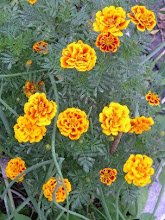Hard to believe that two months have flowed past since April's poetry challenge had me writing a poem a day. May and June have been busy with my last classes of my ESL career (as I see it from here, but you never know) and with rage, grief, and constant reading of news about the oil catastrophe in the Gulf of Mexico. I have been on Facebook more often than not, reading news, posting items on my own page, sharing feelings about this event with like-minded friends. I don't know what this social networking is for others, but I see it as the reason the Internet was invented. I have found a community of interesting, sensitive, compassionate, politically savvy friends via this medium. They are people I know in the Real World, mostly people with whom I had long ago lost touch, as well as people I know only in the Virtual World, some for many years, some for the past months only. Having this medium to vent feelings, gather and share information, has kept me from going completely mad during the past two months since Deepwater Horizon first blew.
If you have read any of my poems on this blog, you know I write about small quotidian bits of life - birds, gardens, weather, food, the conjunction of any of the above - and this Gulf disaster is far too big a subject for my heart to encompass, for my brain to form words. I think about it all the time, I wake in the night imagining the loss of the marshes, the plight of the birds, turtles, sea mammals. I go to the river, the Rio Bravo, or Rio Grande as we call it now, and send my prayers for all of the creatures floating down the redbrown muddy currents to where it empties into the Gulf. A very valuable new friend found on Facebook is a writer named Julia Whitty. She has written quite a few books, and is also an environmental writer for Mother Jones. Her blog, titled, like her most recent book, Deep Blue Home, is on my daily reading list. She has a lovely habit of posting poetry on Sundays, and this one stopped my breath, went straight to my aching heart:
THE SEA CHEWS THINGS UP
by Cleopatra Mathis
When I woke, the waves had gone black,
turning over the macerated
curd of the ocean bottom, heaving its sludge
onto the beach. Some storm far out, I thought,
had ravaged the sea, stirred up its bed,
sent the whole mess flying to shore.
At my feet I found a grave of starfish,
broken and gnarled among the fleshy
snipes and heads. Every shade of death
covered the sand. It looked hopeless
in the pale day but for the birds,
a congress of gulls, terns, and the rarest plovers,
calm for once, satiated, a measure of
the one law: this sea will claim it all—
feed them, catch them, grind their complicated bones.
Wednesday, June 30, 2010
Subscribe to:
Post Comments (Atom)

No comments:
Post a Comment